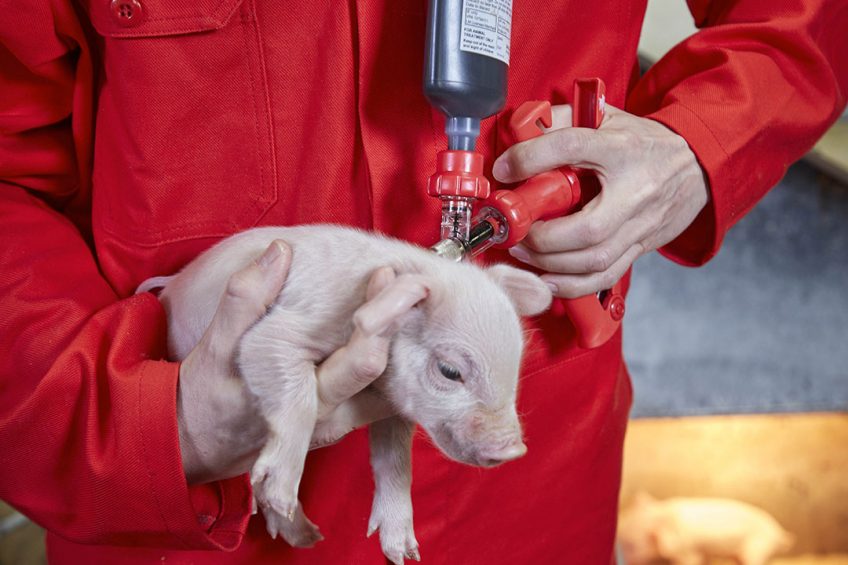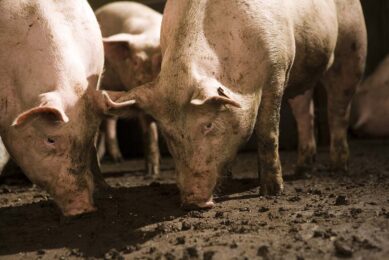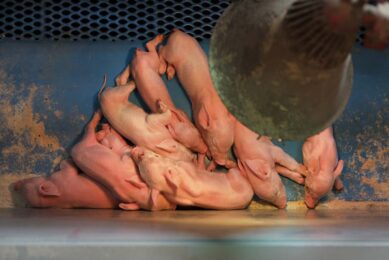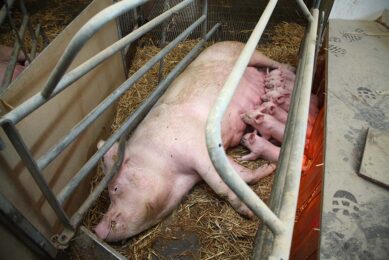Setting the trajectory for optimal growth

One of the most important transitions in a pig’s life occurs at weaning when piglets are exposed to numerous stressors and challenges.
On any given farm, as many as 92% of piglets could be considered anaemic due to iron deficiency by having inadequate haemoglobin levels at weaning. Studies have shown this can be source of costly losses in the wean-to-finish period given the close relationship between haemoglobin and growth. Improvements in a herds blood haemoglobin levels at weaning can lead to an economic return of up to € 2,08 per pig marketed.
Prevalence of anaemia in swine farms
Iron is a trace element and a vital constituent of haemoglobin. Piglets are predisposed to iron deficiency anaemia as a result of:
- Low body iron at birth,
- Inadequate supply of iron from milk,
- No source of environmental iron,
- Rapid growth rate and
- Large litter sizes. 200 mg of injectable iron given at day 1 to 3 has long been standard practice for preventing iron deficiency anaemia in piglets.
However, recent studies have shown that as many as 92% of piglets remain clinically or sub-clinically anaemic at the time of weaning as they have outgrown the initial dose of iron given early in life. Several studies evaluated the impact of iron deficiency anaemia on post-weaning weight gain. Differences of up to 0.82 kg of growth in the three weeks post-weaning have been reported between piglets with optimal haemoglobin levels (> 110g/L) and piglets deficient haemoglobin (<90g l) at weaning.>
One such study, published in 2015, was conducted on five conventional sow farms in Denmark with an average size of 1000 sows. All herds were administered a single 200 mg dose of injectable iron from different commercial products at 3–4 days of life. One piglet was randomly selected from 20 litters at each farm for blood collection at 1-3 days before weaning. In total 99 piglets were enrolled in the study but 3 were excluded from analysis after being lost to follow-up. The associations between each measured haematological parameter and the average daily gain (ADG) of piglets in the 3-week post-weaning period were evaluated. This study showed a positive association between haemoglobin and ADG in the 3-week post-weaning period, while red blood cells and haematocrit also had positive associations with ADG (Figure 1). An increase in 10 g haemoglobin/l blood at weaning corresponded to a weight gain improvement of 17.2 g daily weight gain in the 3 weeks post-weaning.
Figure 1 – Association between haemoglobin concentration at weaning and average daily gain (ADG) 3 weeks post-weaning in piglets.

Achieving optimal haematological status
During the first weeks after weaning, intestinal absorption of iron and other minerals is not fully functional. This explains the importance of optimal haematological status at weaning to achieve peak post-weaning growth. In a peer-reviewed study published in 2010, researchers studied the timing of expression of genes involved in intestinal iron absorption. They concluded that two primary genes necessary for adequate intestinal absorption of dietary iron did not develop until 25-47 days of age or 1-3 weeks post-weaning.
Sufficient stores of iron are critical to growing piglets not only for production of haemoglobin but also for many enzymatic processes in their cells. If iron stores are adequate, this equates to improved oxygen transport, immune function, vitality, metabolism, and intestinal health in the piglets as haemoglobin levels increase. Therefore, to maintain peak performance in modern piglets, injectable iron must be properly utilised during the suckling period to maintain blood haemoglobin levels conducive to our desired level of performance.
Additional iron supplementation
If a herd is anaemic because they have outgrown their first injection of iron, how is it possible to correct the haemoglobin levels to achieve optimal growth results? Recently, a large-scale study took place on a commercial sow farm in the USA. This study evaluated the impact a second 200 mg injection of Uniferon given early in a piglet’s life had on wean-finish growth performance. 3,081 piglets were sorted by weight within litter, individually weighed and allotted to a treatment group within 24 hours of birth. Group A (n=1,544) received 200mg of iron dextran (Uniferon) and group B (n=1,537) received 200mg of Uniferon at the time of allotment and 200 mg at processing. Blood haemoglobin was measured in 100 piglets per treatment group at weaning. All 3,081 piglets were individually weighed at allotment, weaning, 8 weeks post-weaning (WPW) and 18 WPW. Only 8% of piglets that received a single 200 mg injection of the iron supplement had optimal blood haemoglobin stores at weaning, while 66% of those receiving 2 200 mg doses did. Haemoglobin status at weaning significantly impacted wean-finish growth with pigs who had optimal haemoglobin at weaning outgaining those with deficient haemoglobin by 4.46 kg (Table 1).
When looking at weight gain by treatment group, the group that received two 200 mg doses of the product outgained the control group which only received a single 200 mg dose by 1.44 kg at the end of the study (Table 2).
These results build on previous research that supported improved ADG in the early post-weaning period. This improved growth early in a piglet’s life leads to improved growth performance all the way through finishing. This can result in a significant economic advantage for pork producers even after factoring the cost of product and labour associated with a second iron injection. Data presented at a recent conference reported that these losses in ADG associated with sub-clinical or full-scale iron deficiency anaemia are costing pork producers > € 530 million in lost opportunity in the European Union, and > $ 340 million USD in the United States.
References available on request
Author: Chris Olsen, Technical Services Veterinarian, Pharmacosmos
 Beheer
Beheer





 WP Admin
WP Admin  Bewerk bericht
Bewerk bericht